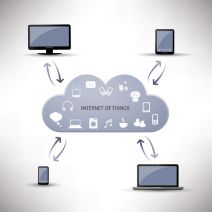Have any question?
Call (409) 861-4450
Call (409) 861-4450
Cyber security professionals and Internet users rejoice, for the “Spam King,” Sanford Wallace, has finally been sentenced for his longtime use of stolen Facebook credentials to spam other users. Between 2008 and 2009, he had stolen credentials for Facebook accounts, and then used the accounts to send credential-stealing web links. Now, he gets to spend the next two and a half years in prison, and pay an oddly-specific fine of $310,629.
There aren’t many instances of hackers targeting physical infrastructure, but the few that make themselves known tend to be quite catastrophic. Take, for example, the devastating cyber attack on the Ukrainian power infrastructure, which left thousands of citizens powerless. Now, several months later, authorities believe that other major countries could also become a target of similar attacks.
Time hasn’t been kind to the password. It’s continuously put down as one of the least secure methods of protecting systems. It’s not due to any fault of the password, though. People just have a hard time remembering long and complex passwords. To aid in security, it’s recommended that you use some sort of multi-factor authentication. While some users prefer easy SMS message two-factor authentication, there are actually many different types of multi-factor authentication available.
Security is a hot-button issue for all types of businesses, but cyber security is such a complex subject that it’s difficult to jam-pack its many intricacies into one blog article. Sometimes understanding just a few ways to improve your business’s security practices can be a significant benefit for your organization.
 There are many types of malware out there, but few are as scary as ransomware. Imagine being struck by a threat that instantaneously locks down your files and keeps you from accessing them until you pay a certain amount of money. If your business is targeted by ransomware, would you be able to protect it from dragging your operations into a bitter pit of despair?
There are many types of malware out there, but few are as scary as ransomware. Imagine being struck by a threat that instantaneously locks down your files and keeps you from accessing them until you pay a certain amount of money. If your business is targeted by ransomware, would you be able to protect it from dragging your operations into a bitter pit of despair?
 Any business that deals with online technology needs to be aware of the dangers that come with the territory. Hackers are more common nowadays than ever before, and organizations that don’t take a proactive approach to keeping threats out of their systems will have to suffer the consequences. Unfortunately, some organizations won’t be aware that they’ve been hacked until it’s far too late.
Any business that deals with online technology needs to be aware of the dangers that come with the territory. Hackers are more common nowadays than ever before, and organizations that don’t take a proactive approach to keeping threats out of their systems will have to suffer the consequences. Unfortunately, some organizations won’t be aware that they’ve been hacked until it’s far too late.
 Businesses today are responsible for keeping the data in their care safe from hackers. There are two kinds of data that a business must protect: the information of their customers, and their own data (eg. company policies and employee information). Which of the two do you think the average business does a better job of protecting?
Businesses today are responsible for keeping the data in their care safe from hackers. There are two kinds of data that a business must protect: the information of their customers, and their own data (eg. company policies and employee information). Which of the two do you think the average business does a better job of protecting?
 Small and medium-sized businesses continue to have problems shoring up their cyber security. Even with the latest solutions, like antivirus and firewalls, they still need to be wary of impending attacks. New threats are created on a daily basis, all of which want to infiltrate your network and cause harm to your business. In fact, 27.3 percent of all malware in the world was created in 2015 alone. Will we ever escape from the clutches of malware?
Small and medium-sized businesses continue to have problems shoring up their cyber security. Even with the latest solutions, like antivirus and firewalls, they still need to be wary of impending attacks. New threats are created on a daily basis, all of which want to infiltrate your network and cause harm to your business. In fact, 27.3 percent of all malware in the world was created in 2015 alone. Will we ever escape from the clutches of malware?
 Google might be best known for its search engine and groups of desktop apps, but it’s also known for innovating and rattling the cages of how we live our lives. One of the ways it’s doing so is with Google Wallet, an app that’s designed to make sharing cash and money transfers online even easier. What a lot of people forget, however, is that Google Wallet, and its associated card, can still be the target of fraud.
Google might be best known for its search engine and groups of desktop apps, but it’s also known for innovating and rattling the cages of how we live our lives. One of the ways it’s doing so is with Google Wallet, an app that’s designed to make sharing cash and money transfers online even easier. What a lot of people forget, however, is that Google Wallet, and its associated card, can still be the target of fraud.
 Firewalls are one of the most common IT security measures on the market today, and for good reason. They act as the first line of defense against any incoming threats, and without them, your organization would have to deal with one data breach after another. Of course, that’s only if you’re taking advantage of a proper firewall; if not, you should seriously consider doing so as soon as possible.
Firewalls are one of the most common IT security measures on the market today, and for good reason. They act as the first line of defense against any incoming threats, and without them, your organization would have to deal with one data breach after another. Of course, that’s only if you’re taking advantage of a proper firewall; if not, you should seriously consider doing so as soon as possible.
 2015 was a brutal year for major corporations, as one by one they fell victim to hacking attacks. Major organizations like Blue Cross Blue Shield, Anthem, and even the United States Office of Personnel became victims of major hacking campaigns. A fact that’s often lost amongst these details is that not all hackers use their skill for evil actions, even if they are still illegal.
2015 was a brutal year for major corporations, as one by one they fell victim to hacking attacks. Major organizations like Blue Cross Blue Shield, Anthem, and even the United States Office of Personnel became victims of major hacking campaigns. A fact that’s often lost amongst these details is that not all hackers use their skill for evil actions, even if they are still illegal.
 Let’s say you get an email from a close friend. It looks like it’s legitimate, until you check the contents of the message. It’s an advertisement, or it’s trying to get you to click on a link to see something “important.” Regardless of what the content of the message is, you should probably slap that bad boy in the Spam section of your email inbox. You’ve just been the target of email spoofing, and it’s more common than you might think.
Let’s say you get an email from a close friend. It looks like it’s legitimate, until you check the contents of the message. It’s an advertisement, or it’s trying to get you to click on a link to see something “important.” Regardless of what the content of the message is, you should probably slap that bad boy in the Spam section of your email inbox. You’ve just been the target of email spoofing, and it’s more common than you might think.
 Security is a huge problem for businesses that take advantage of the cloud, but never to the same degree. It’s often the nature of the industry which dictates how much a business should invest in cloud security. However, despite these differences in policy, there are some aspects of cloud security that absolutely can’t be overlooked, including data permissions, account security, vulnerability to malware, and other online issues.
Security is a huge problem for businesses that take advantage of the cloud, but never to the same degree. It’s often the nature of the industry which dictates how much a business should invest in cloud security. However, despite these differences in policy, there are some aspects of cloud security that absolutely can’t be overlooked, including data permissions, account security, vulnerability to malware, and other online issues.
 Most computer users should practice the policy of ensuring optimal security on their PCs. To this end, assuming that you’ll be hacked (or at least targeted) at some point is pretty reasonable, as it allows you to plan ahead and take preventative actions. Still, there are plenty of people in the world who don’t care enough or worry enough to make security-minded decisions. Contrary to popular belief, there are countless ways that a hacker can take advantage of a hacked PC.
Most computer users should practice the policy of ensuring optimal security on their PCs. To this end, assuming that you’ll be hacked (or at least targeted) at some point is pretty reasonable, as it allows you to plan ahead and take preventative actions. Still, there are plenty of people in the world who don’t care enough or worry enough to make security-minded decisions. Contrary to popular belief, there are countless ways that a hacker can take advantage of a hacked PC.
 In the near future, there will be many new devices connecting to the Internet. Some will be useful, while others will be… not so much. Either way, the fact remains that, according to IDC, the Global Internet of Things (IoT) spending is expected to reach around $1.3 trillion by 2020. That’s a pretty huge number, and we’ll tell you why your organization needs to keep the IoT in mind when putting thought into your technology strategy.
In the near future, there will be many new devices connecting to the Internet. Some will be useful, while others will be… not so much. Either way, the fact remains that, according to IDC, the Global Internet of Things (IoT) spending is expected to reach around $1.3 trillion by 2020. That’s a pretty huge number, and we’ll tell you why your organization needs to keep the IoT in mind when putting thought into your technology strategy.
 Email is an aging communication protocol, but it’s still an important asset nonetheless. Even though society continues to push toward bigger and greater things, the modern office still depends on having an email solution for a communication medium. While we can’t get away from email completely, it’s important to make sure that using it is as easy as possible, especially for the busy business owner.
Email is an aging communication protocol, but it’s still an important asset nonetheless. Even though society continues to push toward bigger and greater things, the modern office still depends on having an email solution for a communication medium. While we can’t get away from email completely, it’s important to make sure that using it is as easy as possible, especially for the busy business owner.
 With the critically-acclaimed television series, Game of Thrones returning to viewers this spring, it seems apt to discuss a manner of hacking attack called Dyre Wolf. This particular threat is just as fierce as its name implies, and can potentially cost businesses between $500,000 to $1.5 million per attack. It takes advantage of a multi-step phishing process, and your employees should understand how to avoid attacks like these.
With the critically-acclaimed television series, Game of Thrones returning to viewers this spring, it seems apt to discuss a manner of hacking attack called Dyre Wolf. This particular threat is just as fierce as its name implies, and can potentially cost businesses between $500,000 to $1.5 million per attack. It takes advantage of a multi-step phishing process, and your employees should understand how to avoid attacks like these.
Get the Knowledge You Need to Make IT Decisions
Technology is constantly evolving, and keeping up can feel overwhelming. Whether you want to understand cybersecurity threats, explore automation, or learn how regulations like PCI DSS impact your business, we’ve made it easy to access clear, straightforward insights on key IT topics.
Learn more about what NetWorthy Systems can do for your business.
NetWorthy Systems
701 W. Division Ave Suite 100
Orange, Texas 77630